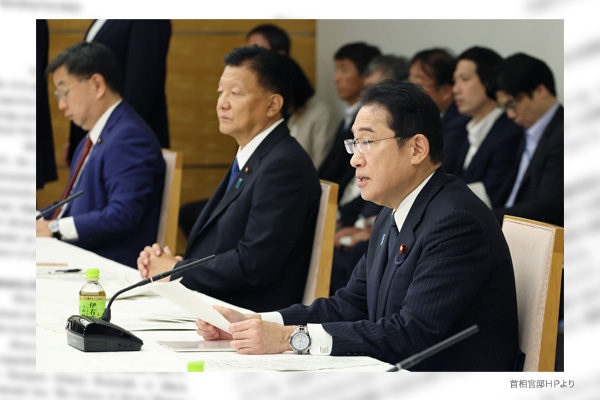A parliamentary group advocating aggressive fiscal policy, which comprises young lawmakers of the ruling Liberal Democratic Party, will soon propose a temporary consumption tax cut. Prime Minister Fumio Kishida should demonstrate leadership towards making the proposal a reality.
The three consumption tax hikes since 1997 are the culprits that have led to chronic deflation that has lasted for more than a quarter century. Even under deflationary pressure growing in the aftermath of the burst of asset bubbles, the government of then Prime Minister Ryutaro Hashimoto in April 1997 increased the consumption tax, cut annual spending, and raised social insurance premiums, leading to chronic deflation. The second Shinzo Abe administration, inaugurated in December 2012, decided to raise the consumption tax in April 2014 soon after the start of economic expansion under its Abenomics policy and in October 2019 when demand began to fall. Consumption tax revenue in fiscal 2022 increased by 12.2 trillion yen from fiscal 2013, but this increase put pressure on households.
The proposal by the above-mentioned parliamentary group to decrease the consumption tax rate to 5% until Japan’s breakaway from deflation makes sense.
Powerful card to overcome deflation
Ironically, it was the COVID-19 pandemic that demonstrated the importance of fiscal stimulus. The late Prime Minister Abe decided to provide a uniform 100,000-yen-per-capita cash stipend and subsidies to micro, small and medium-sized enterprises. Next Prime Minister Yoshihide Suga came into line with the policy. Thanks to the cash stipend and subsidies, many jobs were maintained and damage to households was limited. As the pandemic subsided from late last year to early this year, household sentiment improved, consumption got on a recovery track, and companies became more positive about capital investment and wage increases.
While consumer prices have risen conspicuously against the backdrop of high energy prices following the outbreak of the war in Ukraine last year and the yen’s depreciation, companies have seen growth in sales and profits and raised wages by nearly 4% through spring wage negotiations. Still, wage growth has not kept pace with price increases. Since household budgets have been squeezed, deflationary pressure has not gone away.
The government’s general account tax revenue has increased remarkably, led by consumption tax revenue. Total general account tax revenue in fiscal 2022 was 12.7 trillion yen higher than in fiscal 2019 before the pandemic, meaning that the government deprived the private sector of effective demand (demand backed by money) amounting to the tax revenue increase. An increase in gross domestic product from fiscal 2019 to 2022 was limited to 5.9 trillion yen, less than half the tax revenue growth, due to the negative effects of the consumption tax hikes. In order for the Japanese economy to break away from deflation, it is not enough for the government to expect companies to raise wages faster than inflation. Tax cuts, especially a consumption tax cut, are the key to overcoming deflation.
Overcome opposition from the Ministry of Finance
The Ministry of Finance, which envisions a scenario for another consumption tax hike in the near future, is likely to vehemently oppose even a temporary consumption tax cut. However, it is not the financial bureaucracy that is ultimately responsible for the management of the national economy. It is the cabinet composed mainly of Diet members.
Hideo Tamura is a Planning Committee member at the Japan Institute for National Fundamentals and a columnist for the Sankei Shimbun newspaper.


